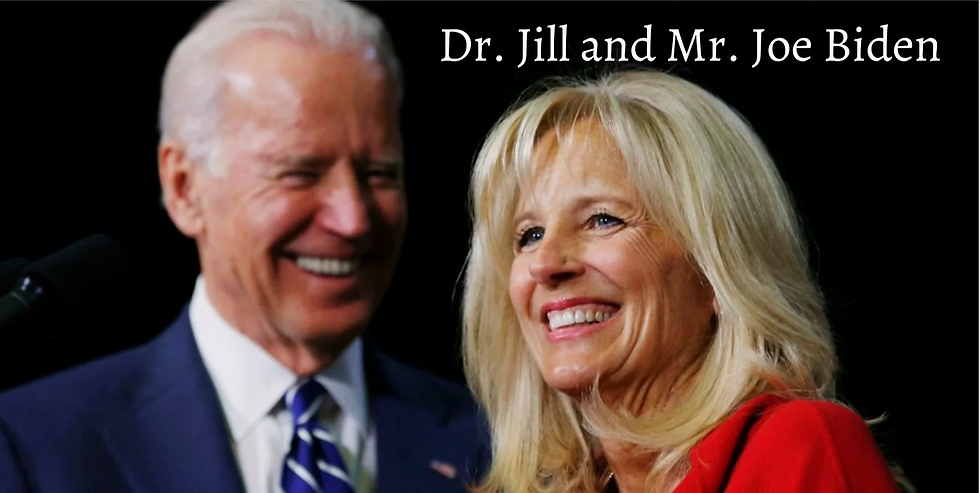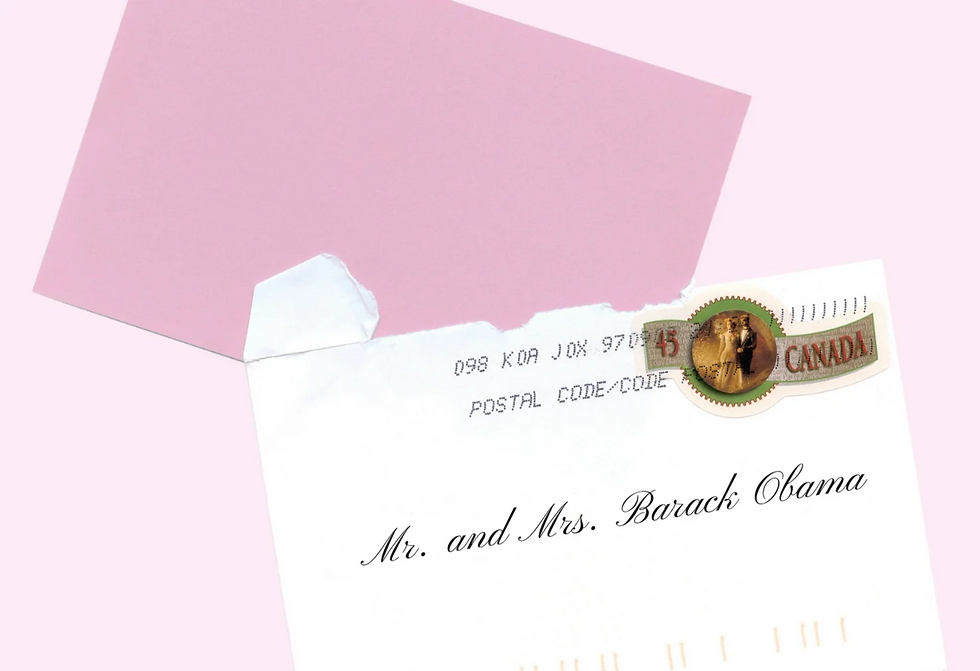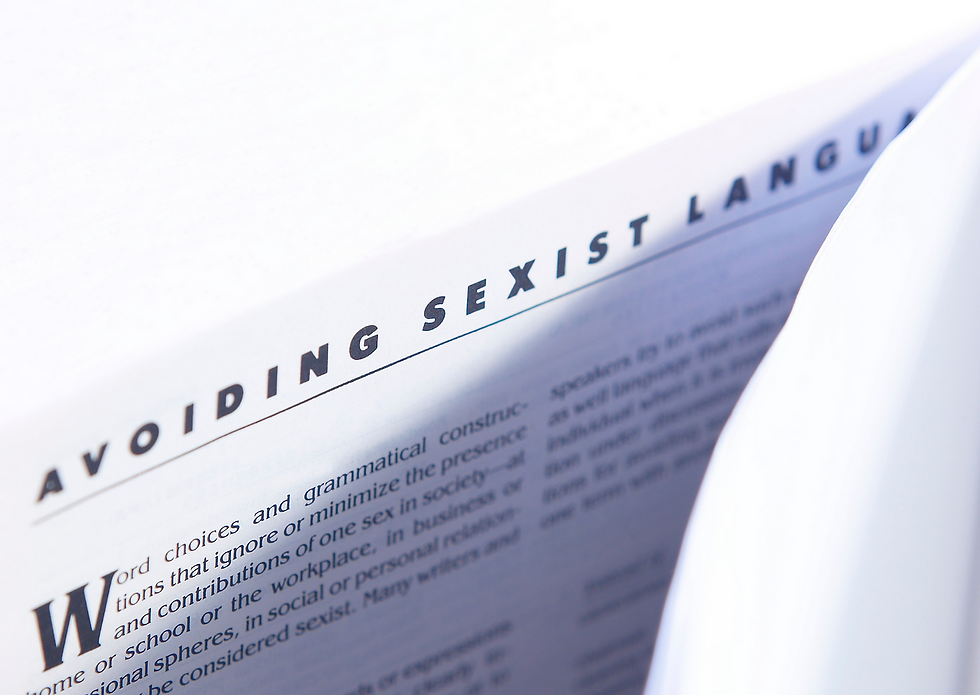Eliminate sexism from your communications (why I love and hate Christmas carols)
- Marie G-G
- Dec 7, 2022
- 4 min read

I first wrote this article in January 2021. You can read my Christmas carol rant there. This is a shorter version.
Each holiday season, I'm reminded of how far we have to go to root out sexism in our language. You can read my Christmas carol rant in Part 1.

Here are eight tips on how to root out the sexism in your language.
1. Never use the pronoun “he” to refer to someone unless you know they use male pronouns
The easiest way to solve this problem is to use the plural form:
The engineer must stamp his specification documents before submitting to the client.
Fixed it: Engineers must stamp their specification documents before submitting to the client.
You can also delete pronouns altogether (“Engineers must stamp specification documents before submitting to the client”) or use an article instead (“Engineers must stamp the specification documents before submitting to the client”).
2. Never use “man” or any of its forms to refer to people in general
No, “man” or “men” do not mean people. Studies have found that when college students were asked to choose pictures that represented “social man,” “industrial man,” and “political man,” students, regardless of gender, chose pictures of men only. Using “man” or “men” to refer to all people is just plain lazy and old-fashioned.

Some alternatives:
Person or people
Humans
Folks
Friends
Can we stop saying "SNOWMAN"? Why are all snow creatures automatically men? Snowperson works just as well!

Instead of “mankind,” say “humanity” or “humankind.” “Man-made” can be “human-made” or “synthetic.”
I’m trying to stop saying “you guys,” which is not gender inclusive.
3. Stop saying “man the table”
Often the people staffing a table or booth are women. “Man” is the transitive verb form of “man” as a noun. It comes from the military, such as “man the ship” or “man the machine guns,” or as Wiktionary says, “to brace oneself or fortify or steel oneself in a manly way.”
We do not need to brace ourselves in a manly way to staff a booth!

So many alternatives to this one!
Staff (my preference)
Fill
Occupy
Be assigned to
Operate
Run
Be in charge of
4. Root out any pronouns or titles that confer gender onto a role
Here are some examples and easy substitutions for sexist terms:
Chairman Chair/Chairperson
Foreman Supervisor
Mailman Mail carrier/postal worker
Fireman Firefighter
Policeman Police officer
Businessman Businessperson
Congressman Member of congress, legislator
Caveman Cave dweller, prehistoric person
Salesman Sales clerk/shop person/shop assistant
Stewardess Flight attendant
Waitress Server, wait staff
5. Avoid “girls,” "gals," or “ladies”
Girls: As a woman in her 50s, I should be the only person who calls myself a “girl,” as in “girls’ night out.” People who identify as female and who are over 21 are not “girls.” They are women.
Gals: I've always disliked the term "gal," even worse than "girl." It also has racist history like "boy." In the article, "Slave Names in the Americas," Paulette Brown-Hinds writes that "Contempt for the male was removing his honorific attachment to fatherhood and manhood by being addressed as 'Boy.'...Females were called 'Gal,' 'Girl,' or the name of some animal." Not only is the term "gal" sexist, removing one's womanhood, but it's also racist. Banish it from your vocabulary.
Ladies: Have you noticed that “lady” is used dismissively, such as “that lady,” “an old lady,” “the lunch lady,” “a bag lady,” or “the cleaning lady”? As for "ladies and gentlemen," what about the nonbinary folx who are excluded in this term?
I am no lady! I prefer to think of myself as a badass!

Time to update our language!
6. Always use parallel terms

Professional accomplishments: Remember when 83-year-old failed academic Joseph Epstein dissed Dr. Jill Biden's academic degree? Women with advanced degrees experience these types of dismissals every day. Each time we do not confer a professional title when a woman is acting in that capacity, it diminishes her accomplishments. Use female professionals' titles (Ms., Dr., Professor, Pastor, Rabbi) unless the person gives you permission to use a more casual name.

Everyday language: In the UK, it’s common for grown women to be referred to as “girls” at all ages, and it’s cringeworthy to hear about “the men and the girls” who are in their 60s or even older!
7. Screw outdated etiquette!

Why do people revert to the 19th century when people get married? Brides.com* still advises addressing invitations as “Mr. and Mrs. Thomas Warren.” There’s nothing that ticks me off more (well, okay, “manning the booth,” perhaps) than being erased in my marriage. I am not Mrs. Michael Gettel-Gilmartin. I have a name, and I consider it an insult when my name is not used.
Failing to use the woman’s name is sexist. I don’t care about the old-fashioned etiquette. The irony of wedding etiquette is when my husband and I had separate names (as we did the first 13 years of our marriage), my name would have been included on a formal invitation…but since we hyphenated our names, now it would be left off. Ridiculous.
*Minted.com, Zola.com, and Shutterfly.com are old-fashioned like Brides.com. More progressive wedding websites like theknot.com are much more inclusive in their approach.
8. Stop using sexist terms

These phrases are sexist and should be struck from our everyday usage:
Man up
Grow a pair
Throw/cry like a girl
Pussy or c*nt (as an insult)
Bitchy
Blonde (have you ever seen a man be accused of “being a blonde”)?
Cat fight (when men debate, we call it debating or discussion)
Slut/frigid/easy/tease/loose/man eater/cougar/asking for it/prude (only said about women)
Frumpy
Let herself go
Ladylike
Moody
Oversensitive
Hysterical
Chick lit
Mommy blogger
Girl boss
She wears the pants
Tomboy
Girly (because boys can like pink and sparkly too)
Macho
Effeminate
Housewife or househusband (I prefer “household manager”)
MILF
Emotional or worked up (as in, “Don’t get worked up”)
Calculating
What am I missing here? Which sexist words drive you up a tree? I’d love to hear your perspective.
Let me know if you can use help with internal or external communications, marketing, or leadership.
I help professional services firms avoid BORING and boost employee engagement, productivity, and readership. I translate technical, complex, and lackluster language into accessible, dynamic, story-driven text. Get known in your industry through outstanding thought leadership content. Walk your talk through outstanding, effective communications with your employees and clients.
Fertile Ground Communications LLC is a certified women-owned business enterprise, disadvantaged business enterprise, and emerging small business.



Comments